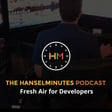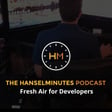Introduction and Sponsor: Tuple
00:00:00
Speaker
Hey friends, it's Scott. I want to take a moment in the middle of the show here and just thank our sponsor, Tuple. I was chatting with Johnny Marler recently. You know, Johnny, isn't screen sharing like a solved problem? Like why would I even consider something custom or a premium tool like Tuple?
00:00:15
Speaker
Yeah, i I asked the same question when I when i first heard about Tuple. um But what you realize is once you try Tuple, coding is a completely different experience than a meeting.
00:00:26
Speaker
It's interactive, it's fast-paced, there's exchange, and you know it requires precision, um unlike a meeting. So it's kind of like, you know why would you buy a gaming mouse when a laptop trackpad works fine? Yeah.
00:00:39
Speaker
you know Technically, you can play Elden Ring with the DK bongos, it's possible. But if you know if you want to play it well, you want a nice controller. um So it's the same with Tuple. People use Teams and Zoom for meetings because they're optimized for business conversations. But you know we need something for pairing, and that's what Tuple is. It's just one click to jump on a call, to share your screen, to start annotating on that screen. And Tuple is optimized so that you can actually still compile your code while you're pairing.
00:01:05
Speaker
um So yeah, I use tuple and it just makes pairing so much nicer than when using generic screen sharing tools and yeah Yeah, I think if I'm already spending like a ton of money on a fancy keyboard or fancy machine, I want the best tools for the job. Like Jedi builds their own lightsaber and Tuple is definitely a lightsaber worth checking out. You can see them at tuple.app.
00:01:27
Speaker
It's the best remote pair programming app on both Mac OS and
Kat's Journey and Learning as a Junior Engineer
00:01:31
Speaker
Windows. Hi, I'm Scott Hanselman. This is another episode of Hanselman. Today I'm chatting with Kat. She's a junior software engineer and a recent computer science graduate. How are you?
00:01:40
Speaker
I'm doing well. are you, Scott? i'm getting I'm getting there. I'm getting there. yeah So you you say junior. You say you're a junior software engineer. I've heard early in career. I've heard all kinds of different things, but you you lean into that.
00:01:54
Speaker
Yeah. um I don't really think anything of it. I don't know if I'm supposed to. i don't It is what I am. yeah you get Yeah? i' not you're You're what, a year and a half of internships?
00:02:07
Speaker
How long have you been working? Uh, two years and four months. Okay. So that's like half of five years, which is half a half a decade. i mean, i don't know, like it could be spun.
00:02:19
Speaker
Does it feel like a lot or does it still feel like you just don't know anything? Um, depends on the day. Yeah. Same. Yeah. Most days I feel competent.
00:02:34
Speaker
Some days I'm like, oh yeah. yeah I know why they hired me. i I am a gift.
00:02:42
Speaker
And then sometimes I'm just like, I don't know. I work at a really large company and there's so much context that you have to learn to be competent, you know, just like, oh, don't, don't use this, ah this thing, you know, you I don't know. I don't know how to explain that, but It depends.
00:03:06
Speaker
It depends. If I could help you with that, because I work at a big company too, and it's like, yeah it's not about this keyword or that keyword or this bit of syntax of TypeScript or whatever. It's more like, oh, that system was built 10 years ago, and if you touch it this way, it'll fall over, and like don't push that button.
00:03:22
Speaker
It'll blow everything up. like There's all these little things that are... passed on sometimes with the oral tradition and sometimes are documented and like, oh, that was Jeff and he's not here anymore.
00:03:33
Speaker
Like that kind of context. And you don't learn that in school. Definitely not. Yeah. Yeah. um im I'm so thankful that I have the opportunity to work professionally because this is just the best opportunity.
00:03:48
Speaker
learning environment for all the things I didn't know in class. And I get paid. that yeah the The pay part is actually a benefit. So you you don't learn how to
Academic Experience vs. Real-world Engineering
00:03:57
Speaker
do this in class. like you Most class things in the first two years or three years of ah a four-year degree are like small things, like tic-tac-toe or like rebuild an operating system.
00:04:06
Speaker
And then towards the end, it's like senior project time or maybe a small group project. But it doesn't it feel like working on a team of 10, 15, 50 engineers is not done at all in school? Like, did they set you up for success at all in school?
00:04:22
Speaker
I mean, to the best of their ability, I would say. i would say a lot of teachers that I, excuse me, professors, that I, you know, had the opportunity to study under, most of them kind of just went from bachelor's master's slash PhD and into teaching like um there were very few professors that had like extensive professional software engineering experience.
00:04:52
Speaker
I am always gentle and careful about how I phrase this, but sometimes you just got to like take a stand. i I was an adjunct professor at two Oregon schools, and I've guest lectured at multiple schools, including the one that you graduated from. And I feel like there are professors out there that have never worked in industry. That doesn't mean that there're their information is not valuable. It just means that they're missing information.
00:05:19
Speaker
arguably a large amount of context.
Purpose of College: Job Prep or Learning?
00:05:21
Speaker
Would you prefer to have someone work in industry for 10 years and then go teach? And would they have taught you differently? So for some things, it's not necessary.
00:05:32
Speaker
um So I would say like the earlier sort of classes, like what is it, discrete math or like, you know, just like the... Which you use every day at BigCo, I'm sure.
00:05:45
Speaker
Like I just, I don't really... I don't think everyone has to have that. But as we start getting towards the higher level classes, um the ones right before you graduate, I do think it is very and important or helpful because i think there are some things that professors may have put emphasis on that when you're out in the real world, not necessarily, who cares?
00:06:12
Speaker
but Like, that's not, I don't know. I think there's Yeah, I think it would have been helpful. That being said, i mean, there's only so much you can do unless you're actively in the workforce. So I don't know.
00:06:26
Speaker
and don't know, Scott. great That's a great answer. I think the challenge is like, are they representing reality? Are they representing a past reality? Like I had professors in the nineties that kind of like had dropped out of the industry.
00:06:44
Speaker
So then the question is, did they leave because they were frustrated or did they leave? Cause they couldn't hack it. Did they, do were they mad? Like I had one guy who was like at IBM and it he spent all this time just hating on IBM. Like we were in a compiler's class and all this guy is doing is telling me how IBM sucks.
00:07:00
Speaker
Yeah. Yeah. So it's like, I don't i don't want to deal with his emotional baggage about being in industry. Yeah. I mean, you know so, you know, as you know, i've I've had a whole other major before
College vs. Bootcamp: A Personal Choice
00:07:12
Speaker
this. I graduated from econ.
00:07:14
Speaker
And i mean, it's the same thing. And most- You have two degrees, just for context. Correct. Yeah. You have a b a and went back, got a BS in computer science. Correct. And so, and, you know, while I was at my first um alma mater, which is UC San Diego, I worked at the Career Services Center too, like helping students get jobs. And i i mean, academia does the best that it can, but I think it goes back to like, well what are colleges for?
00:07:45
Speaker
Are colleges just job preparation houses or are they centers for learning? And so that's so that that probably why I struggle to answer this this this question because depending on what you believe the purpose of a college institution is, your answer will vary.
00:08:07
Speaker
I've always said the the trite and pithy, you go there to learn how to learn. Because I try to explain to my kids is that every single thing that I, like I'm looking at my degree, it's right there from OIT, everything except the language C is gone.
00:08:24
Speaker
Like every operating system, even the source control that I used, it's all dead. Like none of it exists. So like you at least hopefully used Git at school. I did. Yeah. But like it didn't exist for me.
00:08:36
Speaker
t- Sharp didn't exist. JavaScript didn't exist. Like none of that stuff existed. So like why didn't go there to learn those skills. Right. I mean, I did all my word and I did all my word work in VI, which still exists, but I'm not going use it.
00:08:49
Speaker
Yeah. So I figured that i it's the only job that you're constantly learning and have to do study work that you're not getting paid for. a Yeah.
00:09:00
Speaker
yeah I would argue that learning how to learn and also being comfortable with having to learn is more important than this specific set of ah the specific stack that you graduate with. Because otherwise I could have just went to a boot camp.
00:09:19
Speaker
But I specifically wanted to go to
00:09:23
Speaker
a college? Okay. That's a great question because ah that leads up to a great question rather is that I've always felt bootcamps work for great, great for people who are like internally motivated and like, I know I'm doing this.
00:09:36
Speaker
Just give me a little bit of structure and I will do this. While college is like, figure out who you are and figure out what you want to do and explore different classes. And I don't know, I feel like there's, it's good for autodidacts and for people who are self-motivated to go to a bootcamp, but I don't think I'd recommend a bootcamp anymore. They're not rigorous enough.
00:09:56
Speaker
Yeah. I considered bootcamps. um But, and I, yeah, I always get in trouble when I talk about bootcamps. I mean, I don't want to, do this is the thing, right? Nobody wants to disparage. People ride really hard for their bootcamp. And I don't want to say like, nobody wants to disparage anybody. Yeah. But like, for me, for me, bootcamps weren't,
00:10:22
Speaker
the right solution for a couple of reasons. First, just throwing it out there, i am a Black woman. And that actually that actually came into my decision factor because I thought, look, as a Black woman, I'm going to be held at a higher scrutiny level than my peers, um just because that's just how things work in the hiring market. I just feel like as a Black woman,
00:10:52
Speaker
I need to prove myself harder than maybe someone who's, you know, not heavily represented in the tech industry already.
00:11:04
Speaker
So yeah, I thought- how did a college though fix that? How to how did a college versus a bootcamp help make that better for you or make you feel more comfortable? Because I think that no matter what the lip service that the industry has paid towards like we don't care wherever you come from. We just want you to be skilled.
00:11:24
Speaker
People overwhelmingly hire people with college degrees. They hire people with pedigree, you know, and that's just kind of how it is. And so I think that bootcamps work for, worked for, you know, a, an amount of people.
00:11:41
Speaker
I didn't want to, I didn't want to risk it. I wanted to have the easiest hiring process experience that I could possibly have given, given my circumstances. And I knew it would be easier if I had a college background.
00:11:56
Speaker
My 17 year old, literally yesterday, cause we're doing the common apps right now. He's a senior. We're doing like recommendations and common app and all this kind of stuff. He says, do we, do I even need to go to college? I mean, like college is just me. Like if you see someone's degree, it just means this is a serious person.
00:12:12
Speaker
I was like, I never heard that phrase like that. He's just like, he met someone who like went to Cornell or something, which would be a very intimidating thing. Like, oh God, Cornell. yeah I went to Portland Community College and went to Cornell.
00:12:24
Speaker
know what I mean? Like went to PCC Sylvania. We always say that when you're like Portland Community College, you don't just say that you went to Portland Community College, you actually hit the specific campus because yeah somehow Sylvania is like what more serious than Tannisborne or like Cascade. I don't know.
00:12:39
Speaker
I went to pieces of Slovenia. very serious person. But my, my son said he met someone and they were like, yeah, I went to blah, blah, blah, Cornell. Or one guy, one of his buddies is at Northwestern. And he's like, this just means you're a serious person. So I have to go to school for four years just to prove that I'm serious.
00:12:54
Speaker
And I'm like, and Yeah. yeah like Yeah. Because I want to be like, no, you go and learn. like you Yes. But if you're into that, like you know if you're a super jazz, yeah, go and take underwater basket weaving, take all the electives, have a blast. College is a joy.
00:13:10
Speaker
But also, if you just want to get a job, it is a crucial checklist. It's like, yep, did it. The thing is, though, the first couple of years, they care. How many years in the biz until you think they stop caring?
00:13:23
Speaker
Right. And yeah for me, it was like five to 10 years. Maybe for you, it'll be 10 to 15. But like at some point, someone will stop caring once yeah once you have a two page resume or three page resume.
00:13:34
Speaker
Yeah, yeah. And I've even heard like from friends who are in the program that, you know, they they were working professionally, but they felt that not having the degree kind of held them back from maybe promotions, you know, getting into leadership positions. And so.
00:13:53
Speaker
they got the degree to get them to the next step. I did that. So so okay so I graduated high school in 92, but I didn't, and I went to so went to college immediately, but I didn't graduate with my four year degree until 2003. So it literally took 11 years of like working and going to school at night and credits expiring, which is like a whole thing they don't tell you. Mm-hmm. Like if like writing 121 apparently is not universal. It expires after seven years to take it again.
00:14:25
Speaker
Like all of that kind of drama. And I did it because it's like, I don't think they're going to let me get senior engineer if I don't become, you know, yeah did it get a degree. But it was also imposter syndrome that it's like, and even now, like literally even now, 30 years into my, my, my career, I'm thinking maybe a master's degree in like ML would help. Really?
00:14:45
Speaker
Just because it's like, like, I don't know all the stuff. I mean, who does? Well, but this is the thing, right?
Continuous Learning in Tech
00:14:52
Speaker
It feels like everyone else knows all this stuff because I'm in those meetings with them and they're really smart.
00:14:56
Speaker
Yeah. I am very much a big, well, it feels like everyone else. And I'm very fortunate to still be in contact with my, my cohort. And they're like, no.
00:15:08
Speaker
no Some people do, some people don't. Like i was talking with i'm a principal engineer at Microsoft ah named Safia Abdullah, and she said the coolest thing. She said, competence is a really good way to build your confidence.
00:15:23
Speaker
Yeah. I was like, Oh, I'm gonna put that on a t-shirt. yeah Like that, that is so true. Like being able to say, no, I'm pretty sure I know how this works. I built it or whatever, you know, is a very comforting thing.
00:15:34
Speaker
That's, I mean, When you you know ask me about like, do I still feel like a junior? There are days where I'm like, you know what? i'm I can feel in my bones that I really know how to do this because the last couple of times I rocked it. So yeah, I feel pretty good about this.
00:15:56
Speaker
I don't like saying imposter syndrome. think it's- No, I know. I've said for years I have it, but at the same time, it's like, it depends on what I'm making. Yeah. Yeah. Yeah. Like if, if, if it's making webpages, got that making cloud applications that got that, but like,
Imposter Syndrome in Tech
00:16:12
Speaker
I've got this Altair behind me, which is like an old computer from the seventies. Yeah. And I am sitting here literally, I'm holding up right now for those who are listening to this on audio, like the printed guides. Yeah. Last night I was like three hours of going through like assembly and I'm like, I don't know anything about computering.
00:16:32
Speaker
i know nothing. Uh, but it's like, but I do, I'm just digging it out of the archives. So, okay. So maybe you and I know how to do webpages, but we don't know how to do iOS apps, or maybe we know how to do that, but we don't know how to make device drivers.
00:16:46
Speaker
But then it's like, well, but if I did for six months, then I would know that too. so Yeah, exactly. yeah Hey friends, this is Scott. I want to take a moment to thank our new sponsor, Postman Flows.
00:16:57
Speaker
I was chatting with Roderick from Postman. You know, Roderick, what is one thing that you thought would be simple, but it turned out to be surprisingly hard? And what did you learn from it? My biggest learning has been that AI can only compensate what for what you don't know only so much.
00:17:13
Speaker
So if you really don't know what you're doing, you really can't wield ai in very powerful ways, particularly when you're composing APIs together or you're building a You can get to good outcomes from scratch, but if you're iterating, you really have to start understanding what's actually happening under the covers, and you still have to peel the layers of abstraction.
00:17:31
Speaker
at least where we are today, that may change in the future. And I found that visual languages, visual construction helps me quite a bit in that regard. So if you're an expert, you're now world class.
00:17:43
Speaker
But if you're a newbie, then you're still a newbie, just with more dangerous capabilities. And that's where it's an exciting world for us. We have to make sure that we're building and empowering people with the right tools, with the right guardrails so that they can create good things, but not do harm, but particularly when you connect them to APIs that can um send payments or do transactions on your behalf.
00:18:04
Speaker
One of the great tools for visualizing how easy it is to do this kind of work is Postman Flows. It lets you orchestrate APIs, logic, and data visually. You can check them out at postman.com slash
Building Projects Outside Work
00:18:15
Speaker
HanselMinutes. You've a really great blog at catexcellence.io, and it's got just a ton of blog posts. I want to hit on a couple of them.
00:18:21
Speaker
Yeah. One of them, I thought, really stuck with me because it said, learning to build without motivation. Yeah. Yeah, that was a recent one. Yeah, because there's just like there's this my not myth, but there's this kind of like ethos of you, you know, oh, we only hire people who are building nine to five and also building five to nine. like they got to like They got to be excited about engineering. but And I'm kind of guilty of that because i'm my hobbies are also building stuff at night.
00:18:48
Speaker
But I'm motivated by it because like that computer is interesting and I want to understand it. But you're... building outside of work. And you may not be, you may not have, as you say, the juice to do it. had Yeah. i I know the ethos that you're talking about and there are people who can do the same thing 24 hours and not feel burnt out and good for them. I'm so happy for them.
00:19:14
Speaker
um I'm just not one of those people. And it's not, it's not really just software engineering. I used to be a writer before I was a software engineer and I used to blog in my free time.
00:19:28
Speaker
Once I became a full-time professional writer, I stopped writing because it was just too much. It was, it I got burnt out. Like I didn't want to look at words anymore. And so it's, I kind of feel the same way. Like sometimes, you know, I'm more, especially like I work on a, on a very, um,
00:19:50
Speaker
I work on an AI platform team and it can be busy. And sometimes it's it's not just nine to five. Sometimes it requires a little bit more time than that.
00:20:05
Speaker
And at the end of that day, I don't want look at code. want to go play volleyball. to garden. want to... i want to go play volleyball i want to look at my my garden i want to read a fantasy novel, like sometimes i just don't want to do the same thing that I've been doing for eight hours. And i don't think that there should be anything wrong with that either. And I, I would argue that it's completely normal.
00:20:33
Speaker
You say, though, that any progress is progress. Do you have to, like, study? Because you said you you feel junior. You feel early in career so far on some days. Do you say, you know, I'm going to go and learn this thing for an hour? Do you sit down and assign? Like, I put an hour on my calendar, sometimes 9 to 5 if I can do it.
00:20:53
Speaker
We're also like I'm going to sit for lunch and I'm going to read this this technical paper. What's your studying like if you don't have the juice to do it? Yeah. So... Right now, I'm going through the full stack open, which is something I've already done before, but it's been, I'm a Java girl.
Revisiting Courses for Skill Refresh
00:21:12
Speaker
It's okay, nobody's perfect.
00:21:17
Speaker
um And it's been so long since I've touched React, since I've touched JavaScript, TypeScript, that I just, I want to feel more competent in it.
00:21:29
Speaker
So to me, studying looks like just going through the exercises, going through the problems and like getting refresher in it. Does that answer your question?
00:21:40
Speaker
So full stack open, you can see it full stack open.com. And it's actually the exact same course that was taught at a university in Finland. And it's like, they put the entire course online. It's very rigorous. How far into it are you?
00:21:55
Speaker
Part two. aren You feeling pretty good about it? You know? Yeah. I mean, like I said, like you read, i i do believe that any sort of progress is progress.
00:22:08
Speaker
And at the end of the day, like, I still work a full time. It's not like I'm, I'm not developing any sort of software engineering schools. I work as a professional software engineer, but where I want to be, which is being more comfortable with open source tooling and just being able to just get up and go with anything um from scratch. Like I want to be able to do that.
00:22:38
Speaker
So that is why I take the time to do it. I don't have any pressing deadline to be where I want to be. it's just a desire.
Career Envy and Goal Setting
00:22:50
Speaker
i do a thing where I look at people's backgrounds and if I feel like a little bit of like career envy, I use that as like sort of signal as to, okay, this is something that i want in my life.
00:23:06
Speaker
Like, what do I need to do to sort of get me on the path where I can do this? And so, yeah. Yeah. And, you know, just quieting my, my jealousy monster.
00:23:23
Speaker
ah Yeah, I can feel that. You've got another great blog called Career Cheat Codes for Junior Software Engineers. I would argue, and you wrote this you wrote this one a while back. It was on your one-year anniversary of being full-time professional engineer.
00:23:37
Speaker
I think these are cheat codes for all engineers. I would not i would not preface that. you You say ship code fast. ah Yeah. does that Does that need to be said? Because you actually call out ah Being Glue by Tanya Riley, and I hope you have her on the podcast.
00:23:51
Speaker
Yeah. Yeah, um I love that blog so much. um I love her blog. She's she's so great. um She's such a valuable resource for us. Baby engineers on the internet. Proving your worth as a junior. like Everyone's like, why am I here? What am I doing?
Importance of Shipping Code Early
00:24:05
Speaker
You're saying try to do two to three impactful PRs every week. like You're saying shipping is the point. like What do we do here? We ship. Pull requests. Yeah. Yeah. Now that, okay, so now that I've been working for a little bit, and two to three PRs, I would probably, I would go to pass me and be like, okay, girl.
00:24:25
Speaker
but Is that too much? I mean, are you one PR? The thing is, like, what is a PR? Is it ah bug fix or is a full-on feature? Something that's impactful, right? like who Like, who cares?
00:24:37
Speaker
um And for me, PRs doesn't necessarily have to be code. That could be documentation. we do our We do our code or documentation as code. and anything that can be impactful.
00:24:50
Speaker
The reason why I called out glue work is because i found myself early on doing a lot of the sort of glue work that needed to be done just because it comes natural to me. Like when I was in my previous ah career, I was a senior. And so doing that glue work comes very natural to me.
00:25:12
Speaker
However, when it comes down to what, how has Kat impacted this team? hu They're looking for artifacts.
00:25:25
Speaker
And it's really hard to,
00:25:31
Speaker
it's really hard to document glue work. It's really hard to document like, oh, I connected this person to this person. yeah i made sure this person had contacts. I put everyone together in a room so we could quickly establish what we're even doing here.
00:25:47
Speaker
um And all of that is important. But for juniors early on your career, et etc cetera, et cetera, I would argue that that's not what you need to be doing because but that's that's the argument of like, is it activity or is it impact?
00:26:04
Speaker
Yeah. Yeah. And for juniors, my experience is that they're looking at easy impact, like artifacts, like documentation, code, yeah things that you have shipped that have made people happy.
00:26:20
Speaker
My team is very diverse in age and there's people couple of years out of school and the people who've been doing this longer than me.
Documenting Work and the Role of PRs
00:26:27
Speaker
And I, as a general rule, the rule on my team is that if you did a thing, there's a URL that To back that did that thing. Yeah. So if I give you a list of 10 things, yeah you should come back with 10 URLs.
00:26:41
Speaker
Yeah. The yeah URL could be a PR. It could be a Word doc. It could be a markdown file. It could be a even a comment on a code review. but And this a generalized you know yeah rule of thumb. But like if it doesn't have a yeah URL, it probably didn't happen.
00:26:56
Speaker
ah hey Now meetings are a squishy one, right? Because the thing about meetings is you have all this energy, like, oh, you we we're very excited, like a generated energy and everything like that. And then the meeting just dissipates.
00:27:07
Speaker
Yeah. And it never, like what happened? Well, we had a meeting. was great. The energy was, the vibes were immaculate at this meeting. Yeah. So make a thing, like make, do the docs, do the docs. Yeah. Or even like after the meeting, something that I have been doing is,
00:27:25
Speaker
Especially like when we're meeting, it's because one team needs to talk, well, for me, one team needs to talk to another team and we need some sort of thing to understand where we're coming from. Like, oh, you want us to build this thing? Why? What's the context?
00:27:40
Speaker
What are the requirements? Et cetera. So in those sorts of meetings, if I'm doing them, then there's going to be some sort of quick doc that we can all point to where everyone has the context.
00:27:53
Speaker
You can share it We all know what we're doing. and So if you're going to have one of those meetings, there should be some sort of document. um But if you cannot produce it, then maybe as a junior, maybe you don't need to be focusing your effort there.
00:28:08
Speaker
Yeah. One of my favorite cheat codes that you have here is review at least one PR a day. And it's not that cheat code that I think is the nugget of the gold nugget within this.
00:28:19
Speaker
Because yeah, you should probably be reviewing code as well as writing code. But what I liked was that you said juniors often feel like reviewing is intimidating. Like, how do i even review? I don't know anything.
00:28:31
Speaker
so your hack is, which I think is great for seniors as well, is just ask questions if you don't get it. Yeah. And I'm like, that just clicked with me. i was just like, you're right. I would just ask a question.
00:28:43
Speaker
I think the fear is that they're going to flip the bozo bit on you and it's going to like, how do you not know that? But like, how do you get past that? Because it but but you if you ask a good question, you're not necessarily trying to spot mistakes.
00:28:55
Speaker
You're just trying to understand. And then maybe the senior would be like, oh, that's great. That's a great question. Yeah. 100%. Yeah. Like I definitely, even now, like I still can, when there's a title,
00:29:07
Speaker
Like, I can still kind of get, like, a little intimidating. Like, oh gosh. it's Like a fancy title? Like someone's title? Like their job title? Yeah. Like, okay, here I go. Gonna review this principal's, you know, PR. Like, I hope I don't embarrass myself.
00:29:24
Speaker
um You know, or just, like, my tech lead or something like that. Because, like, yeah. I don't know. Has that ever happened, though? Everyone's like, oh, they're going to say... It's not like you're saying, what does DNS stand for? There's stuff you can... You're not asking questions that you couldn't Google. Why would they think you're dumb?
00:29:41
Speaker
Honest question. Why would they think I'm dumb? and We all feel that. I feel that. You feel that. who are listening im always afraid to, like, I don't want to look dumb in this meeting, so I won't say anything.
00:29:51
Speaker
Yeah, I mean, I guess it's just human ego, maybe, just wanting to protect your ego and just scared of putting yourself out there. Yeah. But, you know, that, you know, the sort of thing, like, well, I'm just asking questions to clarify my own understanding.
00:30:07
Speaker
Like, that makes it, makes it less like, oh, I'm, A, it makes it less, if I am pointing out something that should be corrective, it makes it less like, um well, you, you know, you got to do this. And more so like, hey, interesting that you chose to do it this way. Like,
00:30:27
Speaker
can you tell me more about the context of this or something like that? a Maybe I am wrong or maybe, you know, that gives them the opportunity to think more about why they're doing it that way.
00:30:39
Speaker
But when I ask, you know, with the sort of like perspective of learning, I think, I think it's just good for everyone because it it makes it like an easy conversation.
00:30:53
Speaker
and also I think, I think job places should be places for learning. Like, I think that's what we should be doing is learning and teaching each other. And it makes it less of a, um it's it's not as intimidating, no matter what level, you know, when I'm approaching a PR.
00:31:12
Speaker
And then people have, you know, come back and said, you know, thought more about your question. and I decided, why don't I just refactor this to make it more easier? Or people have said, you know, if it's not obvious when you're asking, then I've clearly over engineered this and need to make this more simpler. And so i honestly, I think that's where juniors can kind of shine.
00:31:39
Speaker
Because I think that seniors, because they have the experience, because they have the context, because they're operating at, you know, have been operating at this level, I think they need someone like a junior to be like, hey, actually looking at this code for the first time without all the context that you have, it's not easily clear to me what what's happening here and why.
00:32:02
Speaker
And that's, that's helpful for them, you're giving them, you know, that fresh pair of eyes. um That's that's needed.
Mentorship and Safe Learning Environments
00:32:10
Speaker
Let me ask this question as we close, because I'm working on this paper with my buddy, Mark, and I have this theory that when we make apprenticeship, internship, internal company boot camps, we label the juniors with names like intern or apprentice. And you've done a lot of great internships at a lot of really great companies.
00:32:33
Speaker
h I feel like by labeling the early and career person intern or apprentice, you're basically... demanding that they transcend this label that you've given them of small. And we should flip that so that the senior is given a title like proctor or preceptor and it is, they are graded on how well they're bringing the next generation up. So there's a formality to it as opposed to like, Hey, Kat, you're new.
00:33:02
Speaker
Here's an old guy named Scott. Who's going to judge you while you write code. Yeah. Right. Kind of traditional internship. Like here, you don't know any of these people or this code or the context. Enjoy. Good luck. Yeah. You survive. Yeah.
00:33:16
Speaker
It's like, okay, we're going to take a bet on you for the next one, two, three years. You're going to sit and all of the things that I did over the last several decades of like running a site and feeling what it's like to run a live site and accidentally deleting production and like all this stuff that every good senior engineer has done.
00:33:33
Speaker
you need You will have a safe place to do that. So it's almost like, I feel sometimes like electricians have more training than software engineers when it comes to like pairing up with elders and and doing new stuff. So what do you think about a model like that that kind of flips internships on their head?
00:33:52
Speaker
Yeah, I mean, anything that gives less experienced people the opportunity to learn in a safe space and also give senior people the incentive to teach.
00:34:08
Speaker
um I think that part, because, you know, everyone's got deadlines, everyone's got their KPIs, whatever that they need to hit.
00:34:21
Speaker
That being said, i think there the company has a responsibility to keep the next generation going, to always have a skilled next generation. And so, yeah, anything that does work both of those things I'm all for.
00:34:41
Speaker
ah dig it. And I want to say, I appreciate that you're early in career and you came on the podcast unapologetically. Sometimes yeah when people say, Hey, come on a podcast, they're like, Oh, but I'm an













